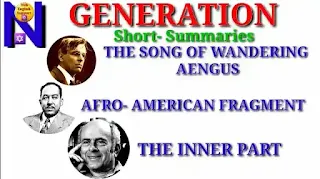UNIT FOUR: HUMAN CONDITION
The Song of Wandering Aengus by W. B Yeats
SHORT SUMMARY
The Song of Wandering Aengus by W. B Yeats
This poem, 'The Song of Wandering Aengus' (Ancient Irishman), was composed by the Irish poet William Butler Yeats. This poem has been taken from 'The Wind among the Reeds'. The poet of this poem has brought a legendary figure, Aengus (regarded as the God of Poetry), to talk about his love in this poem. The poet has an intense love for his beloved Maud Gonne. The poet writes about the help of Aengus in a short narrative form. Every time the memory of the poet's beloved comes into the poet's mind, that's why he creates these lines in the name of his beloved.
The poet talks about an Irish myth in which Aengus is the central character. One day, Aengus goes to the hazelwood. He makes a fishing stick and starts fishing in the twilight. The stars are twinkling, and moths are flying at that time. After some time, Aengus catches a silverfish (trout). He places that fish on the floor. Later on, that fish changes into a glimmering girl. She calls Aengus by his name. The girl disappears from the spot because of the brightening air. After that, Aengus tries his best to search for that glimmering girl but is unable to find her. Aengus goes on imagining that girl. He desires to do various things with that girl. He expects that if he finds her, he will kiss her. He would take her on a long walk on the coloured grass. They would pluck silver apples from the moon and golden apples from the sun. The moon and sun present women and men, respectively. Aengus represents the poet himself. The same thing happened in the life of the poet. He couldn't marry Maud Gonne, and he remained thirsty for her forever. The last line of the poem gives sexual meaning. This is a beautiful fantasy, but it shows the wandering of the poet himself in his quest for love. The poet longs to pluck the fruit of love, but all in vain.
Afro-American Fragment by Langston Hughes
SHORT SUMMARY
Afro-American Fragments by Langston Hughes
This poem, 'Afro-American Fragment', has been composed by American poet Langston Hughes. This is a nostalgic poem in which the poet longs for his native land (the land of black people). The poet has presented the lifestyle of Afro-Americans.
The poet feels dislocated because he is far from his atavistic land. A long time ago, the poet's fathers or forefathers might have been brought into America from their homeland. He knows about black history and their homeland through history books and their songs. In America, black people have a miserable life. They are deprived of various rights. They are ill-treated by the white people on American land. The blacks have forgotten their language as well as their atavistic song. Seeing all such conditions among black people, the poet longs for his homeland. The unclear rhythm of black people's songs inspired him to move towards his homeland. The poet says that he has been fragmented into two parts. Though his body is in America, his heart and mind are both in his ancestral land. The song of Atavistic Land was sung by the poet's forefather. Whenever he hears it, he feels proud of himself. He goes on thinking about the happy past and their freedom. That song brings their memories back into their blood.
The poet also says that in America there is a vast mist of race, which means the black people who were being brought to America as slaves. These people have forgotten everything about their ancestral land due to the extra burden of American-white domination. Now, for the poet, his race becomes like a mist that isn't fathomable (unable to identify). It also suggests the dim vision of the blacks of America.
The poet remembers his ancestral land through history books and black community songs that create a longing for going back to the ancestral land (Africa) in the heart and mind of the poet instead of living a miserable life in the land of America.
The Inner Part by Louis Simpson
SHORT SUMMARY
The Inner Part by Louis Simpson
This poem, 'The Inner Part', has been composed by American poet Louis Simpson. The poet has presented a spiritually dead America after the Second World War.
After winning the Second World War, America regarded itself as superior as well as one of the most important people in the world. They started to dress formally and gave up wearing a simple shirt. Their wives stopped scratching in public places and left, saying the informal word 'Gosh'.
According to the poet, the word humanity is a mere word in a country that is spiritually dead. Americans forget their ground. They try to be more formal and superior. The poet shows how America was spiritually dead and corrupt after the Second World War. There is no sense of humanity in the hearts of Americans. Americans have been enjoying material comforts, worldly treasures, and pleasures.
The poet says that Americans improved their economy, but they misunderstood love and kindness. The poet shows their external side of life, which seems good but isn't good internally in the real sense. The poet compares their sons with a smooth V-8 engine and their daughters with a highly sensitive tip of the fly leg.
The priests started examining the inner parts of the birds, and they found the birds' hearts had been misplaced. The poet satirises the sons and daughters by comparing them with inanimate objects. American productive seeds are as black as death. This corrupts the inner part of the civilization, and the black seeds are as black as death and produce a bad, strange odour.
Thanks for Visiting my Website: Suraj Bhatt


Post a Comment